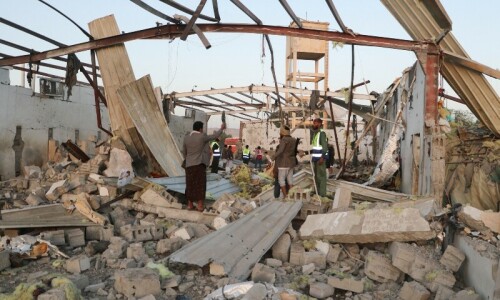LARKANA: In a crackdown against illegal medical practitioners, some 17 quacks were rounded up and their clinics sealed in Larkana district on Saturday.
Police came down hard on quacks in the wake of the recent surfacing of HIV-positive cases in Ratodero and in its suburbs. FIRs were registered under sections 417, 419 and 269 of the Pakistan Penal Code (PPC) against the arrested suspects, police sources said.
Larkana Commissioner Saleem Raza Khuhro and Deputy Commissioner Noman Siddik, speaking to the media at the local press club said very soon action against quacks, illegal blood banks and laboratories would be initiated.
The intensity of action would be felt throughout the province, the commissioner claimed. The official number of quacks, according to district health managers, was around 270 but other sources put it at around 1,100, he said.
The commissioner apprehended that the number could be much higher, and said: “According to my estimates, it may run into around 4,000 to 5,000.”
Number of cases in Ratodero continues to rise
He said cases would also be registered against owners of the premises who had rented out their shops to quacks.
Regarding the recent discovery of HIV cases in Ratodero, he said quackery was the potential source of spreading the disease while unsafe use of blades by barbers came as the second major cause. Commissioner Khuhro said improper disposal of hospital waste and use of recycled implements [syringes and cannulas] also contributed to the spread of HIV.
“We have received complaints that even new syringes contained blood traces and hair,” he revealed, adding: “We are worried about the HIV-inflicted patients,” he said.
The real challenge for us, he said, was to save the rest of the population from this deadly disease by taking precautionary measures. He urged the media to refrain from mentioning the names of the HIV patients and showing them on TV channels.
He said that in the action taken against quacks so far, 54 clinics, blood banks and laboratories had been sealed.
Till Friday, blood screening of 3,500 persons was conducted and 128 of them appeared to be HIV-positive cases. Of them, 102 were children, he said. Meanwhile, Faryal Talpur, the MPA from Ratodero, along with PPP Sindh president Nisar Ahmed Khuhro on Saturday visited the blood screening camp at Ratodero Taluka Hospital where 457 persons underwent the HIV test. Eight of them, including six children, were diagnosed to be HIV positive, according to sources.
CMCH operating theatre closed
The orthopaedic department at the Chandka Medical College Hospital (CMCH) had to postpone about 50 surgeries, which were kept on the list for Friday and Saturday, due to defective autoclave system.
The two autoclave machines present in the Unit-II of the department are meant for steam sterilisation of clothes, instruments and other items used in different surgical procedures.
An assistant professor of orthopaedics on condition of anonymity told Dawn that the matter had been conveyed in writing to the CMCH medical superintendent but in vain. Even at the eleventh hour, he dropped message on his (MS’s) mobile phone to inform him about the situation but to no avail, he added.
Dr Abdul Malik Shaikh, in a letter to the MS on May 3 pointed out that the autoclaves of the department were out of order and the operating theatre in-charge had time and again informed the hospital management.
But they [autoclaves] were not repaired. “We are compelled to postpone the operations; we [surgeons] are unable to perform operations till the replacement of the old autoclave with a new one”. When this reporter visited the orthopaedics Unit-II on Saturday, its operating theatre was found closed.
Associate Prof Dr Zameer Soomro working in the unit and other doctors confirmed postponement of about 50 surgeries.
This tertiary hospital caters to the needs of patients from Larkana, Sukkur divisions as well as parts of Balochistan and Punjab. Suspension of regular services, even for a couple of days, multiplies sufferings of the patients visiting the health facility from far-flung areas.
Published in Dawn, May 5th, 2019















































